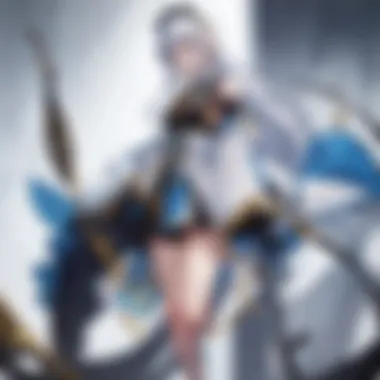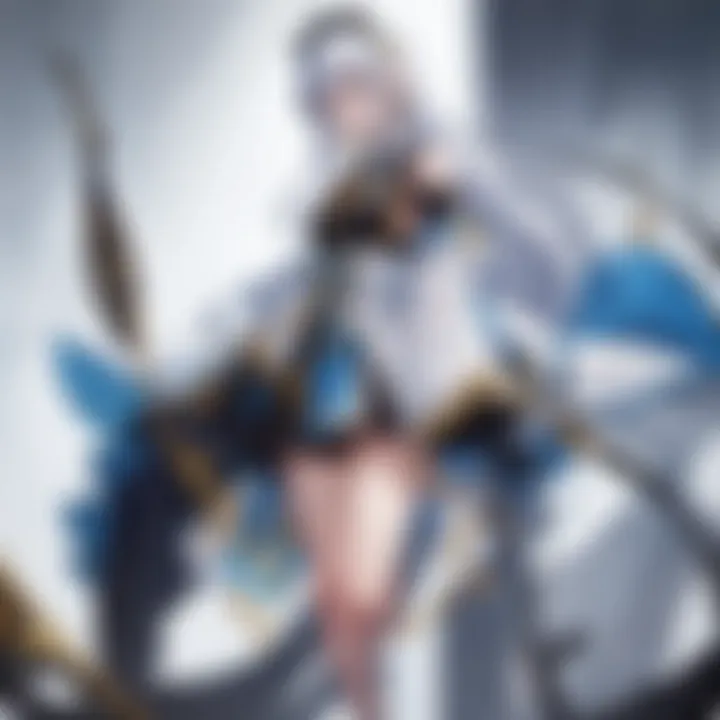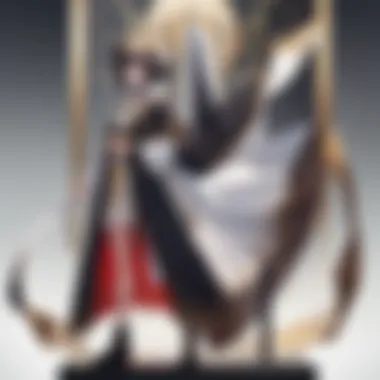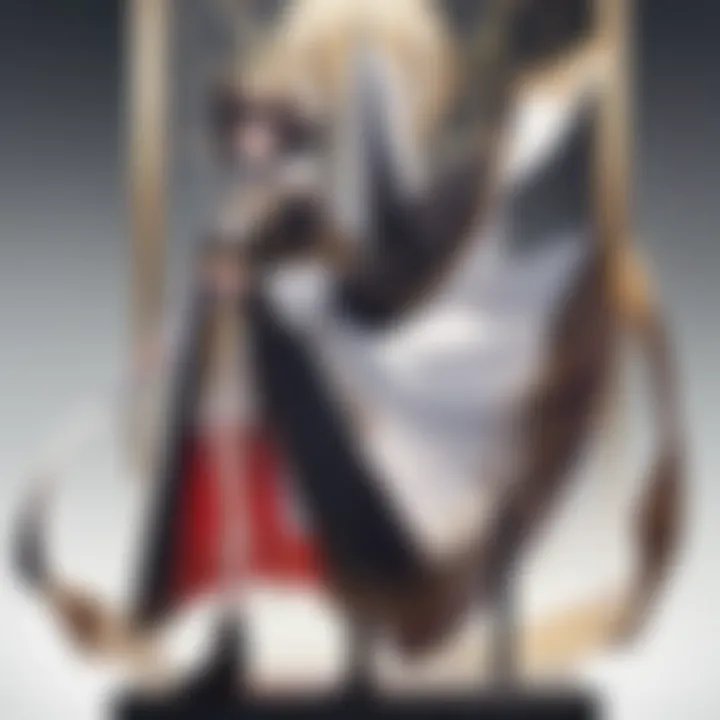Exploring the Narrative Dimensions of 'Obey Me, Solomon'


Intro
The world of anime and manga is rich with narratives that challenge viewers' perceptions of power and morality. One such narrative is found in 'Obey Me, Solomon.' This multimedia experience engages with complex themes and character interactions, making it a centerpiece for discussion within relevant communities. The significance of its storytelling goes beyond the surface, inviting an analysis of how these elements resonate with contemporary societal issues. By delving into its character dynamics and thematic undercurrents, we can better appreciate its impact on audiences.
Character Analysis
Overview of Character Development
In 'Obey Me, Solomon,' characters do not merely exist to advance the plot; they evolve, reflecting their inner conflicts and growth. Each character embodies specific traits that engage with the overarching themes of power, obedience, and morality. For instance, the protagonist's journey is pivotal in illustrating personal authority versus imposed control. Their gradual transformation captures the essence of rebellion against unjust authority, a notion that resonates in today's discussions about agency across various platforms.
The narrative effectively employs a range of characters who mirror each other’s strengths and flaws. This interdependence enriches the character arcs and emphasizes the idea that growth is often facilitated through relationships. Their challenges serve to deepen the audience's emotional engagement, illustrating the intricate dance between obedience and personal moral compass.
Key Relationships and Dynamics
Relational dynamics within 'Obey Me, Solomon' significantly contribute to the narrative's depth. The interactions among characters are meticulously crafted, revealing layers of loyalty, betrayal, and the quest for power. The protagonist’s relationships with key characters are crucial for understanding the moral dilemmas they face.
- Power Struggles: Conflicts between characters often center around who possesses authority and how it should be wielded. This exploration sheds light on how different perspectives influence decisions and relationships.
- Obedience and Resistance: The characters embody varying degrees of obedience, leading to compelling tension. This dynamic allows for a nuanced exploration of whether one should comply with authority or challenge it.
- Morality and Ethics: The ethical ramifications of their choices provoke questions about right and wrong in complex situations. Through these relationships, the narrative prompts the audience to reflect on their own definitions of morality.
"In narratives like 'Obey Me, Solomon,' character development is not just about growth, but about understanding the moral landscapes that shape our decisions."
Thematic Exploration
Central Themes and Messages
'Obey Me, Solomon' excels in weaving complex themes into its storytelling framework. The central theme of power dynamics serves as a foundation for exploring obedience and agency. The narrative invites viewers to scrutinize the moral implications of yielding to authority. This theme resonates deeply in our current societal context, where authority is constantly being questioned.
Moreover, themes of loyalty play a critical role. The characters' allegiances are tested, revealing the fragility of trust and the consequences of choices made under duress. These tensions lead to rich conversations about the implications of one's decisions, encouraging the audience to ponder their values.
Cultural Context and Influences
Understanding the cultural context in which 'Obey Me, Solomon' exists enriches the narrative analysis. The series reflects and critiques societal norms and expectations surrounding obedience and authority, themes that are prevalent not only in anime but also in broad cultural discussions today.
The influence of contemporary issues, such as the rise of social movements and challenges to traditional structures of power, can be seen throughout the series. This alignment with real-world concerns enhances its relevance and allows audiences to draw parallels with their lives.
Intro to 'Obey Me, Solomon'
The complexity of storytelling in anime and manga is profoundly illustrated in the series 'Obey Me, Solomon.' This multimedia narrative engages its audience not just with a captiveting plot but also through intricate themes and character developments that resonate with viewers. Understanding this introduction is essential, as it sets the stage for a detailed examination of the series’ narrative dimensions.
Overview of the Series
'Obey Me, Solomon' presents a world where power dynamics are pivotal. The series intricately weaves together elements of fantasy with moral challenges. It invites viewers into a realm governed by authority and the struggle against it, positioning characters in roles that reflect the complexities of human emotion and decision-making. The plot revolves around supernatural beings, creating a rich backdrop for exploring these themes.
The setting combines familiar aspects of traditional anime while incorporating fresh perspectives. The character designs and universe building help in immersing audiences, ensuring that every dimension of the plot feels credible yet extraordinary.
This elaborate framework allows various story arcs to unfold that highlight individual choices and the repercussions that unfold from them. As the narrative progresses, viewers are put in a position to question their own morals and the nature of obedience. This approach elevates the series from typical genre stories to a thoughtful exploration of deeper societal issues.
Significance in the Anime and Manga Landscape
In the broader context of anime and manga, 'Obey Me, Solomon' plays a significant role by pushing boundaries of conventional storytelling. The combination of personal struggles within a larger societal framework isn’t just engaging; it stimulates critical thought among its audience. The themes of authority and rebellion resonate in contemporary contexts, reinforcing the series' relevance.
"The tension between obedience and resistance in 'Obey Me, Solomon' reflects real-world dynamics that many face today."
Moreover, the series stands out for its blend of humor and seriousness. While it balances lighthearted moments, the core of the story remains grounded in serious themes. This dichotomy within the narrative structure ensures a multifaceted approach that appeals to a diverse audience. The reception within the anime community demonstrates its impact, as discussions surrounding character arcs and moral choices frequently surface across platforms like Reddit.
Narrative Structure
The narrative structure serves as the backbone of any story. In 'Obey Me, Solomon', it plays a critical role in shaping the viewer's experience and understanding of the plot and characters. An effective narrative structure guides the audience through complex themes and character interactions, fostering emotional engagement and anticipation. A well-defined structure can elevate a good story to a great one, making it essential to analyze.
Plot Development


In 'Obey Me, Solomon', the plot unfolds with a carefully crafted flow that balances action with moments of introspection. The series introduces its central conflict early, engaging the audience's curiosity. As events progress, twists and turns in the narrative not only keep the viewer invested but also deepen the thematic exploration of authority and morality.
The pacing is significant. It oscillates between moments of tension and calmer scenes, allowing for character development to breathe. We encounter pivotal scenes where decisions lead to unexpected outcomes. This design keeps the audience on edge while also encouraging them to reflect on the implications of each character's journey.
The plot is structured to emphasize the interplay between characters. As protagonists navigate their challenges, the impact of their choices resonates throughout the arcs of supporting characters. This interconnectedness proves essential for understanding the moral weight of each action taken within the storyline. Ultimately, the plot development serves to illuminate core themes, like power dynamics and the nature of obedience.
Character Arcs
Character arcs in 'Obey Me, Solomon' are meticulously developed, showcasing both growth and regression. The protagonists face moral dilemmas that test their beliefs and values. Their arcs are tightly woven with the narrative structure, revealing how external pressures shape their internal battles.
For example, as the main characters confront authority figures, they undergo significant transformations. These changes serve to reflect larger themes of empowerment and submission. The complexity of each character's journey adds depth to the narrative, making their decisions feel impactful.
Supporting characters also play crucial roles in the development of the main protagonists. Their strengths and weaknesses create a rich tapestry, illustrating different perspectives on obedience and authority.
"Character arcs do not exist in isolation; they resonate and reflect the broader narrative themes."
This interconnected approach enriches the viewer's understanding of the series' dynamics. In essence, character arcs in 'Obey Me, Solomon' exemplify not just individual growth, but also the broader implications of the choices made within the narrative framework.
Thematic Exploration
The thematic exploration of 'Obey Me, Solomon' is essential for understanding how the narrative engages with complex issues like authority, morality, and social dynamics. These themes are deeply intertwined within the storyline and character interactions, creating layers of meaning that resonate with the audience. Engaging with these themes allows viewers to reflect on their own beliefs regarding power and obedience, making the series not just a narrative but a platform for critical thinking.
Authority and Power Dynamics
The representation of authority and power dynamics in 'Obey Me, Solomon' manifests in various forms, from overt hierarchical structures to subtler influences in character relationships. The characters often grapple with the constraints imposed by authority figures, creating tension and conflict. This tension is palpable in the exchanges between protagonists and antagonists, where each party seeks to assert their dominance. The struggle for power often leads to moral dilemmas, forcing characters to make choices that challenge their values.
- Hierarchies: The clear delineation of roles among characters highlights traditional power structures.
- Character Interactions: Key dialogues expose the complexities of power and submission.
- Symbolism: Certain elements symbolize control, reinforcing the narrative on authority.
Understanding these layers contributes to a richer viewer experience. It encourages a thoughtful examination of how authority shapes individual actions and motivations, making it a compelling study in human behavior.
Obedience and Resistance
Obedience plays a critical role in navigating the thematic landscape of 'Obey Me, Solomon.' Characters constantly face choices to conform or resist the expectations placed upon them. This dynamic underscores a fundamental question: What is the cost of obedience? As characters take actions that reflect either submission or rebellion, viewers witness the implications of these choices unfold. Such portrayals illuminate the nuanced nature of compliance, showing that blind obedience can lead to dire consequences.
- Character Decisions: Each character’s choice reflects differing views on obedience and personal agency.
- Consequences: The repercussions of obedience often highlight deeper moral questions.
This theme resonates with audiences, prompting them to consider their own experiences with authority and the implications of compliance. The exploration of resistance illustrates how challenges to authority can foster growth and self-discovery, making it a significant aspect of the narrative.
Moral Ambiguities in Decision Making
Moral ambiguity is a prevalent theme in 'Obey Me, Solomon.' The characters face dilemmas that reveal the complexity of right and wrong. These situations are not always clear-cut; instead, they often present shades of grey that challenge the characters' ethical frameworks.
- Ethical Dilemmas: Moments of decision-making force characters to weigh their values against harsh realities.
- Character Development: Characters evolve as they confront their choices, revealing deeper insights into their nature.
This thematic exploration encourages viewers to grapple with their understanding of morality. It serves as a reminder that decisions often come with unintended consequences, compelling audiences to reflect on the intricate balance between duty and morality. In this way, 'Obey Me, Solomon' fosters a dialogue on ethical responsibilities within the context of authority and personal agency.
Character Analysis
Character analysis in Obey Me, Solomon serves as a fundamental aspect when dissecting the narrative intricacies and thematic explorations of the series. Characters embody unique roles that resonate with broader themes, allowing the audience to connect emotionally while reflecting on universal concepts like morality, authority, and resistance. Understanding these characters provides clarity into the driving forces behind the plot and the overarching message that the narrative attempts to convey.
Main Protagonists
The main protagonists of Obey Me, Solomon are pivotal to the narrative's structure. They shape the story's progression and embody the themes of obedience and resistance. Each character is distinctly crafted with specific motivations, flaws, and desires, allowing them to engage with the concept of power dynamics in profound ways. For example, Solomon serves as a keeper of authority but also grapples with the moral implications of his decisions. This duality creates tension and invites viewers to reflect on the costs of leadership and obedience.
Moreover, the way these protagonists evolve throughout the series significantly impacts the audience's perception. Key moments of character development not only drive the plot forward but also present moral dilemmas that provoke thought. The protagonists confront challenges that force them to make choices, which in turn define their identities and further enrich the narrative.
Antagonist Role and Influence
The antagonistic figures in Obey Me, Solomon play a crucial role in amplifying the stakes for the protagonists. These characters are not merely obstacles; they often embody the darker aspects of authority and the potential for moral corruption. The complex portrayal of antagonists invites viewers to question the nature of good and evil within the narrative. By presenting antagonists with relatable motivations or tragic backstories, the series deepens the exploration of authority, urging the audience to contemplate the thin line separating heroism from villainy.
The influence of these antagonists extends beyond mere conflict. They challenge the protagonists' beliefs and force them to confront uncomfortable truths about themselves and the society they inhabit. This struggle against antagonistic forces enriches the narrative, enhancing its depth and complexity.


Supporting Characters and Their Impact
Supporting characters in Obey Me, Solomon provide essential context and richness to the story. They often represent different aspects of the society within the narrative, reflecting diverse beliefs and values. For instance, each supporting character can introduce subplots that enhance main themes while offering contrasting viewpoints that challenge the protagonists.
These characters serve as catalysts for character development and plot progression. Their interactions with main characters can lead to moments of revelation or conflict, pushing the story in new directions. They also help to establish the emotional landscape of the series, making the world feel populated and vibrant. Without the contributions of supporting characters, the narrative would lack the nuanced dynamics necessary for exploring complex relationships and societal themes.
In summary, the character analysis within Obey Me, Solomon not only contributes to understanding the series but also elevates its significance in the anime and manga landscape. Each character, whether protagonist, antagonist, or supporting figure, plays a distinctive role in shaping the narrative and exploring deeper themes of power and morality.
Artistic Elements
Artistic elements play a significant role in shaping the narrative experience of 'Obey Me, Solomon.' The visual and auditory components work in concert to enhance storytelling, draw audiences deeper into the narrative, and reinforce the themes explored in the series. Understanding these artistic dimensions provides insight into how 'Obey Me, Solomon' captivates its audience and maintains a prominent position in the anime and manga landscape.
Visual Aesthetics
Visual aesthetics in 'Obey Me, Solomon' are essential for creating an immersive atmosphere. The character designs exhibit a blend of unique styles and colors that reflect their personalities and roles in the story. The use of bold colors and dynamic illustrations engages the viewer, capturing their attention from the outset. Each visual element, from the environments to character movements, contributes to establishing the tone and mood of the series.
Additionally, the visual storytelling often emphasizes key moments in the narrative. For instance, expressive facial close-ups reveal inner conflicts and emotional struggles, offering depth to character arcs. Backgrounds are meticulously crafted, enriching the setting and providing context to the unfolding events. This attention to detail not only enhances the viewing experience but also reflects the overarching themes of power and morality.
In summary, the visual aesthetics of the series not only serve to attract viewers but also deepen their emotional connection to the story and its characters. This synergy between visual presentation and narrative content is central to the series’ continuing popularity.
Sound Design and Music
Sound design and music are vital components that complement the overall atmosphere in 'Obey Me, Solomon.' The score is carefully composed to match pivotal scenes, thereby intensifying emotional engagement. Utilizing a mix of orchestral and contemporary elements, the music reflects the series' thematic complexity. Each soundtrack plays a significant role, enhancing the viewer's emotional journey.
Moreover, sound effects are purposefully integrated into the narrative. Subtle sounds, like footsteps or ambient noises, immerse the audience further into the world of the series. These auditory layers create a more authentic experience, allowing viewers to feel as if they are part of the unfolding drama.
In addition, character voice acting is crucial. It adds life and personality, making characters relatable. The nuances in vocal performances convey emotions and motivations, enriching the narrative.
Cultural Context
The cultural context surrounding Obey Me, Solomon is crucial to understanding the narrative's intricacies. This multimedia work is a product of Japanese culture, reflecting values, beliefs, and social dynamics inherent in its setting. Engaging with these elements enables readers and viewers to grasp the deeper significance of the themes presented in the series. It also emphasizes how cultural nuances shape character relationships and moral dilemmas, thereby enriching the storytelling experience.
Influence of Japanese Culture
Japanese culture plays a vital role in the narrative structure of Obey Me, Solomon. The series depicts traditional and contemporary aspects, highlighting the significance of authority, hierarchy, and group dynamics. For instance, the concept of 'amae' — a Japanese term describing the desire to be passive and dependent on others — is prevalent in the relationships between characters. This reflection of societal norms can influence character behavior and decision-making.
Moreover, elements such as visual aesthetics, character design, and storyline choices resonate with Japanese cultural practices. The use of color symbolism, such as red representing passion or danger, adds layers to the narrative that resonate well with viewers familiar with these cultural elements.
Global Reception and Interpretation
The global reception of Obey Me, Solomon has shown an interesting interplay between localized themes and universal narratives. Fans outside Japan often interpret and analyze the story through their own cultural lenses, leading to varied understandings of the central themes. This can create a rich dialogue about power, morality, and agency across cultures.
The series has sparked discussions on platforms such as Reddit and fan forums, where interpretations often reflect the cultural backgrounds of the audience members. Engaging with these discussions reveals how the narrative nuances resonate differently, bridging gaps between cultures while maintaining core concepts. This dynamic is essential for any work of art seeking to achieve global relevance.
"Understanding the cultural context of a narrative often enhances the overall experience, allowing for a broader appreciation and deeper insight into the themes and character motivations."
This interplay of culture and narrative adds depth to Obey Me, Solomon, inviting both local and global audiences to engage with its rich tapestry of storytelling.
Audience Engagement
Audience engagement is a vital aspect of the success and resonance of any narrative, including 'Obey Me, Solomon.' This section delves into how this multimedia series fosters connections between the content and its viewers or readers. The series actively encourages participation from its audience, enhancing their experience and creating a sense of belonging within the community.
Community Reactions
Community reactions to 'Obey Me, Solomon' play a significant role in shaping its impact. Fans actively share their thoughts and interpretations, contributing to a vibrant discussion around the series. This community engagement manifests on various platforms, such as Reddit and Facebook, where users dive deep into character motivations, story arcs, and thematic elements.
Discussions often highlight the emotional investment fans have in the characters. For instance, the reactions to character development scenarios showcase a range of emotions, from joy to betrayal. These responses not only give individual fans a platform but also create a collective narrative that adds depth to the official storyline. The discourse serves to validate viewer experiences, reinforcing the notion that their voices matter within the larger narrative framework.
"In a well-crafted universe like that of 'Obey Me, Solomon,' fan engagement transforms passive viewers into active participants, enriching the overall tapestry of the series."
Fan Theories and Speculation


Fan theories and speculation are essential elements of audience engagement in 'Obey Me, Solomon.' As viewers delve into the narrative, they often develop theories about potential plot twists or hidden character backstories. This analytical approach adds layers to the viewing experience, inviting others to critically engage with the material.
For example, fans may debate the true intentions of certain characters or speculate the outcomes of pivotal plot points. Such discussions not only enhance the intrigue but also promote a collaborative environment where fans unite over shared interests.
These theories can lead to a deeper understanding of the characters and themes. They challenge fans to think critically about decision-making and morality presented in the series. As a result, speculation becomes a fundamental part of how the audience interacts with the narrative. Ultimately, fan theories contribute to the overall discourse and increase the likelihood of sustained engagement with the series.
Comparison with Other Works
Understanding the narrative dimensions of "Obey Me, Solomon" necessitates a broader perspective brought about by comparing it to other anime and manga. This comparative approach reveals the series' particular place in the vast landscape of multimedia storytelling. By analyzing similar themes, as well as contrasting narrative styles, we can appreciate the unique elements that define "Obey Me, Solomon".
Similar Themes in Anime and Manga
Many anime and manga explore themes of power, obedience, and moral dilemmas. Aspects such as authority figures, the struggle against oppression, and the moral consequences of decisions create a rich tapestry of storytelling. In "Obey Me, Solomon," these themes are prominent, echoing works like "Attack on Titan" and "Death Note."
- Power Dynamics: Just as Attack on Titan addresses the significance of hierarchy in human survival, "Obey Me, Solomon" delves into how power can shape relationships.
- Moral Choices: Similarly, Death Note presents characters forced to navigate moral ambiguities. Here too, characters in "Obey Me, Solomon" face crucial decisions impacted by their obedience or resistance.
This resonance with familiar themes aids in understanding how "Obey Me, Solomon" expands upon traditional narratives, offering a fresh perspective.
Contrasting Narrative Approaches
While many series tackle similar themes, the narrative approach of "Obey Me, Solomon" sets it apart. Unlike the straightforward storytelling found in some series, its layered narrative encourages deeper reflection.
- Non-linear Storytelling: In contrast to the linear progression seen in works like "Naruto," the narrative of "Obey Me, Solomon" can weave in and out of various character arcs and timelines, enhancing complexity.
- Character Focus: Where some series rely heavily on plot-driven narratives, "Obey Me, Solomon" emphasizes character development, illustrating the personal struggles of its protagonists amidst broader societal issues.
Comparing different works enriches understanding. It allows us to see how "Obey Me, Solomon" dialogues with, responds to, and diverges from other narratives in the anime and manga medium.
In summary, analyzing "Obey Me, Solomon" alongside other works highlights its thematic depth and distinctive storytelling style. This approach not only elevates appreciation of the series but also situates it within greater cultural conversations surrounding authority and morality.
Future Implications
The exploration of future implications in narrative storytelling, particularly in Obey Me, Solomon, is essential for understanding its position in the evolving landscape of anime and manga. This section examines trends impacting thematic development and narrative techniques within the genre, as well as the potential directions for adaptations and expansions based on the established narrative framework.
Trends in Anime and Manga Storytelling
In recent years, there has been a noticeable shift in anime and manga storytelling characterized by complexity and depth. Audiences now demand narratives that evolve beyond traditional tropes. A significant trend is the increasing focus on character-driven stories that delve into intricate relationships and moral dilemmas. Obey Me, Solomon reflects this trend by intertwining themes of power and agency, questioning the very fabric of obedience within its narrative.
Moreover, there's a growing acceptance of darker and more ambiguous themes. The audience shows a preference for stories that do not simply offer clear-cut heroes or villains. Instead, they appreciate narratives where characters are morally gray, allowing for more profound reflections on real-life issues such as authority and individual autonomy. This trend opens up conversations about societal norms and the uncomfortable realities individuals often face, making these narratives resonate on a deeper level.
Potential for Adaptations and Expansions
The flexibility of Obey Me, Solomon in its narrative scope poses various opportunities for adaptations and expansions. The success of multimedia narratives suggests that potential exists in exploring other formats, such as live-action adaptations, video games, or even novels. Each medium offers distinct mechanisms for storytelling that could enhance the series’ themes and reach wider audiences.
For instance, an animated film could condense the narrative, focusing on significant plot points that highlight the moral dilemmas faced by characters. Alternatively, a video game adaptation might allow players to engage actively with the story, making choices that reflect the complex themes of power and resistance, thus expanding the audience's connection to the narrative.
Furthermore, creating expanded universes or spin-offs could explore peripheral characters or subplots, deepening the lore surrounding the main narrative. Such expansions would allow for greater character development and thematic exploration, addressing the anticipation from the fan community eager for more story-rich content.
“Understanding the future implications of a narrative like Obey Me, Solomon not only sheds light on its potential growth but also highlights the changing demands of audiences who seek more profound experiences in cinema and literature.”
Ending
The conclusion serves as an essential component in analyzing 'Obey Me, Solomon.' It is not only a summation of the insights gleaned throughout the article but also a reflection on the comprehensive nature of the narrative dimensions discussed. The significance of concluding this discourse lies in reinforcing key arguments while illuminating the interplay between themes, characters, and cultural implications within the work.
Summation of Key Points
In summary, the key points highlighted in this article encompass various facets of 'Obey Me, Solomon.' These include:
- The intricate narrative structure that effectively develops its plot and character arcs.
- The exploration of profound themes such as authority, obedience, and moral complexities.
- The impact of cultural context on the reception and interpretation of the series.
- The vibrant community engagement reflected in fan theories and reactions.
- Comparisons with other works in the anime and manga landscape, showcasing similar and contrasting themes.
- Future implications concerning trends in storytelling and potential adaptations or expansions.
This synthesis allows readers to grasp how these elements coalesce, illustrating the series' relevance and depth.
Final Thoughts and Perspectives
Ultimately, 'Obey Me, Solomon' stands as a compelling narrative in the anime and manga arena. Its ability to weave intricate storytelling with poignant themes invites continued dialogue and analysis. As audiences engage with the series, they are provoked to think critically about the dynamics of power and the nature of obedience, themes that resonate beyond the screen. As the landscape of anime and manga evolves, the insights from 'Obey Me, Solomon' may provide vital perspectives for both creators and scholars. The exploration presented here underscores the necessity of examining such narratives, as they offer fertile ground for understanding human behavior and cultural contexts.
"In compelling stories, we find reflections of our own values and challenges, making the study of narrative essential."
As the conversation around narratives continues, 'Obey Me, Solomon' encourages both fans and critics alike to consider the deeper implications of the stories they consume and discuss.















